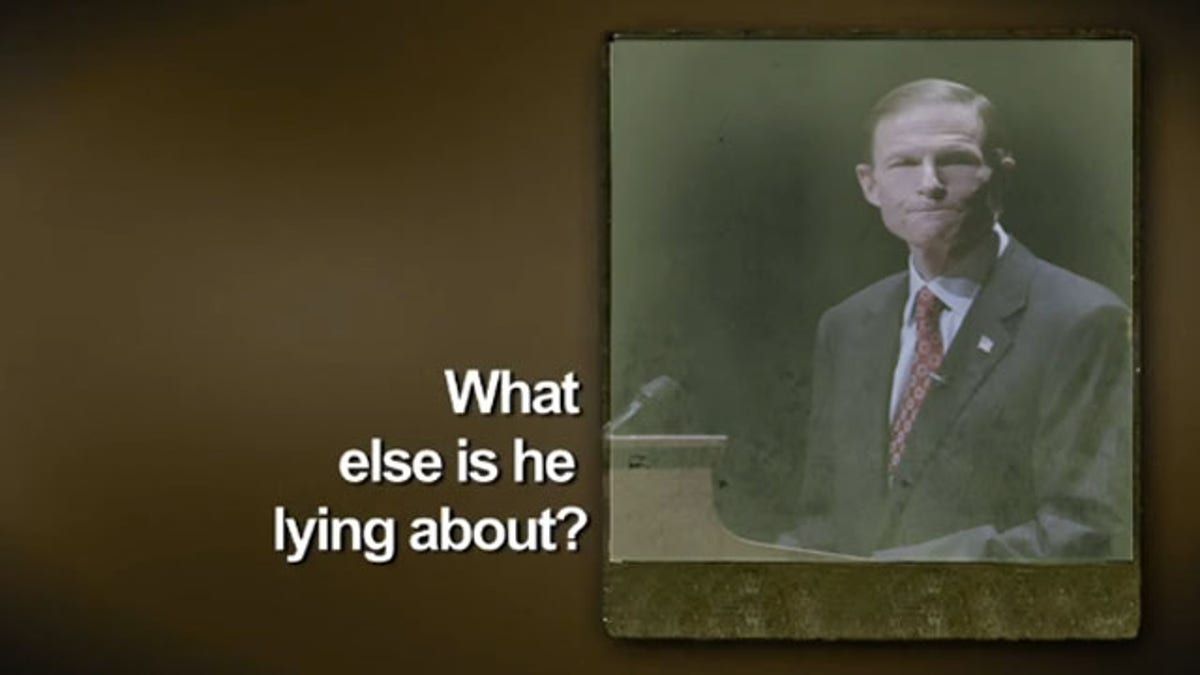
Shown here is an image from Connecticut GOP Senate nominee Linda McMahon's ad against Democrat Dick Blumenthal. (YouTube)
One candidate is the "best friend" an illegal immigrant could ever have. Another has a thing for lying. Another is just plain angry and not fit for government.
These are the unflattering portraits candidates are painting of their opponents, as the TV ad blitz gets increasingly negative before the midterm elections. Declaring this the most negative campaign season on record would be kind of like picking which year sewage smelled smelliest. But the campaign tone of the past few weeks, at the least, shows positive doesn't play in 2010.
"In part it just reflects the volatility and anger and ... disgust of the electorate," Democratic strategist Dan Gerstein said.
Candidates are looking to inflame those sentiments, while at the same time trying to keep pace with each other's attacks.
In Connecticut, Democratic Senate nominee Dick Blumenthal accused Republican opponent Linda McMahon of putting "profits before people" by bandying about a minimum wage decrease. So McMahon accused Blumenthal of lying, something she'd already done in a previous ad that slammed the state attorney general for misstating his Vietnam War record.
In the New York gubernatorial race, Republican Carl Paladino circulated a picture of Democrat Andrew Cuomo covered in mud and then got in a nasty scuffle with a reporter accusing him of pro-Cuomo bias. So Cuomo's campaign released an ad accusing Paladino of having no experience and noting, "his anger is not a governing strategy."
In the battle of the airwaves, candidates are talking less and less about themselves, and more about each other. Gerstein said the tone seems worse than usual, but that the benefit of going negative this year far outweighs the risk.
"They've got nothing else," he said. For Democrats, Gerstein said they can't run on President Obama's policies because they're unpopular. For Republicans, polls show the public still distrusts the GOP despite their inclination to vote for them -- so the party's best bet is to keep on running against Democrats, Gerstein said.
"A lot of it goes back to the old adage of define yourself and define your opponent before they have a chance," said Pete Snyder, a Republican strategist and founder of New Media Strategies.
Though Republican congressional leaders recently unveiled their Contract with America-style "pledge" to voters, GOP candidates have eschewed using that as the basis for policy-based positive advertising in favor of name-calling.
And it could be working.
McMahon has started to close in on Blumenthal in the polls after using tough ads to erode arguably his biggest asset -- his clean-cut image.
Nevada Republican Senate nominee Sharron Angle has effectively closed the gap with Senate Majority Leader Harry Reid, though both candidates have gone increasingly negative. Angle accused Reid of seeking "amnesty" for illegal immigrants over his support of the DREAM Act, which would give some undocumented immigrants a path to legalization via college or the military. She called Reid illegal immigrants' "best friend."
Reid has been equally unkind, accusing Angle of "extreme" and "dangerous" opposition to requiring insurance companies to cover colon cancer tests and other medical services.
Rare is the positive campaign this year, but such a thing does exist. Denver Mayor John Hickenlooper, the Democratic candidate for Colorado governor, has run a startlingly positive campaign -- airing ads that show him doing ordinary things like riding a horse and carrying water to the backdrop of happy music. He pledged to keep things positive in an August ad that showed him showering with his clothes on -- that's because every time Hickenlooper sees a negative ad, "I feel like I need to take a shower."
Hickenlooper is polling strong in the Colorado race, but he's helped by the fact that conservative Tom Tancredo is running a third-party campaign alongside Republican Dan Maes.
On the Senate side in Colorado, Tea Party-backed Ken Buck is leading Democratic Sen. Michael Bennet. Buck's first general election ad accused Bennet of "legislating unemployment."












































